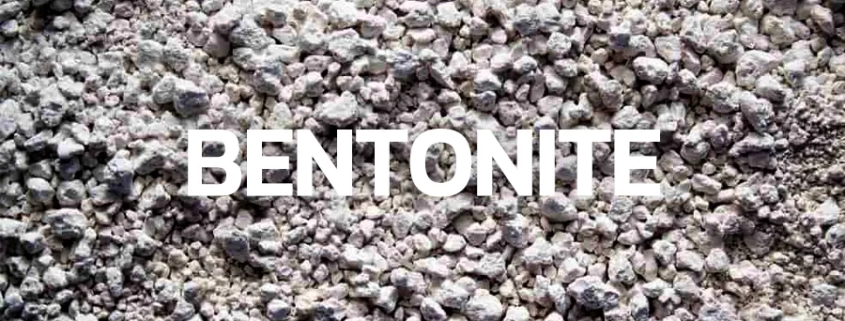BENTONITE
Bentonite is an swelling clay consisting mostly of montmorillonite (a type of smectite) which can either be Na-montmorillonite or Ca-montmorillonite. Na-montmorillonite has a considerably greater swelling capacity than Ca-montmorillonite.
Bentonite usually forms from the weathering of volcanic ash in seawater, or by hydrothermal circulation through the porosity of volcanic ash beds,which converts (devitrification) the volcanic glass (obsidian, rhyolite, dacite) present in the ash into clay minerals. In the mineral alteration process, a large fraction (up to 40-50 wt.%) of amorphous silica is dissolved and leached away, leaving the bentonite deposit in place Bentonite beds are white or pale blue or green (traces of reduced Fe2+
) in fresh exposures, turning to a cream color and then yellow, red, or brown (traces of oxidized Fe3+
) as the exposure is weathered further.
As a swelling clay, bentonite has the ability to absorb large quantities of water, which increases its volume by up to a factor of eight. This makes bentonite beds unsuitable for building and road construction. However, the swelling property is used to advantage in drilling mud and groundwater sealants. The montmorillonite/smectite making up bentonite is an aluminum phyllosilicate mineral, which takes the form of microscopic platy grains. These give the clay a very large total surface area, making bentonite a valuable adsorbent. The plates also adhere to each other when wet. This gives the clay a cohesiveness that makes it useful as a binder and as an additive to improve the plasticity of kaolinite clay used for pottery.
One of the first findings of bentonite was in the Cretaceous Benton Shale near Rock River, Wyoming. The Fort Benton Group, along with others in stratigraphic succession, was named after Fort Benton, Montana, in the mid-19th century by Fielding Bradford Meek and F. V. Hayden of the U.S. Geological Survey. Bentonite has since been found in many other locations, including China and Greece (bentonite deposit of the Milos volcanic island in the Aegean Sea). The total worldwide production of bentonite in 2018 was 20,400,000 metric tons.
Applications:
The main uses of bentonite are in drilling mud and as a binder, purifier, absorbent, and carrier for fertilizers or pesticides. As of around 1990, almost half of the US production of bentonite was used as drilling mud. Minor uses include filler, sealant, and catalyst in petroleum refining. Calcium bentonite is sometimes marketed as fuller’s earth, whose uses overlap with those of other forms of bentonite.
Drilling mud
Bentonite is used in drilling mud to lubricate and cool the cutting tools (drill bit), remove cuttings, stabilize the borehole walls, and help prevent blowouts (by maintaining sufficient hydraulic pressure in the well). Bentonite also curtails drilling fluid invasion by its propensity for aiding in the formation of mud cake. Much of bentonite’s usefulness in the drilling and geotechnical engineering industry comes from its unique rheological properties. Relatively small quantities of bentonite suspended in water form a viscous, shear-thinning material. Most often, bentonite suspensions are also thixotropic, although rare cases of rheopectic behavior have also been reported. At high enough concentrations (about 60 grams of bentonite per liter of suspension, ~6wt.%), bentonite suspensions begin to take on the characteristics of a gel (a fluid with a minimum yield strength required to make it move).
Binder
Bentonite has been widely used as a foundry-sand bond in iron and steel foundries. Sodium bentonite is most commonly used for large castings that use dry molds, while calcium bentonite is more commonly used for smaller castings that use “green” or wet molds. Bentonite has also been used as a binding agent in the manufacture of iron ore (taconite) pellets as used in the steelmaking industry. Bentonite, in small percentages, is used as an ingredient in commercial and homemade clay bodies and ceramic glazes. It greatly increases the plasticity of clay bodies and decreases settling in glazes, making both easier to work with for most applications.
The ionic surface of bentonite has a useful property in making a sticky coating on sand grains. When a small proportion of finely ground bentonite clay is added to hard sand and wetted, the clay binds the sand particles into a moldable aggregate known as green sand used for making molds in sand casting. Some river deltas naturally deposit just such a blend of clay silt and sand, creating a natural source of excellent molding sand that was critical to ancient metalworking technology. Modern chemical processes to modify the ionic surface of bentonite greatly intensify this stickiness, resulting in remarkably dough-like yet strong casting sand mixes that stand up to molten metal temperatures.
The same effluvial deposition of bentonite clay onto beaches accounts for the variety of plasticity of sand from place to place for building sand castles. Beach sand consisting of only silica and shell grains does not mold well compared to grains coated with bentonite clay. This is why some beaches are much better for building sandcastles than others.
The self-stickiness of bentonite allows high-pressure ramming or pressing of the clay in molds to produce hard, refractory shapes, such as model rocket nozzles.
Purification
Bentonites are used for decolorizing various mineral, vegetable, and animal oils. They are also used for clarifying wine, liquor, cider, beer, mead, and vinegar.
Bentonite has the property of adsorbing relatively large amounts of protein molecules from aqueous solutions. Consequently, bentonite is uniquely useful in the process of winemaking, where it is used to remove excessive amounts of protein from white wines. Were it not for this use of bentonite, many or most white wines would precipitate undesirable flocculent clouds or hazes upon exposure to warm temperatures, as these proteins denature. It also has the incidental use of inducing more rapid clarification of both red and white wines.
Bentonite is also considered an effective low-cost adsorbent for the removal of chromium(VI) ions from aqueous solutions (contaminated wastewater).
Absorbent
Bentonite is used in a variety of pet care items such as cat litter to absorb pet waste. It is also used to absorb oils and grease.
Carrier
Bentonite is used as an inert carrier for pesticides, fertilizers, and fire retardants. It helps ensure that the active agent is uniformly dispersed and that pesticides and fertilizers are retained on the plants.
Filler
Bentonite is used as a filler in a wide variety of products, including adhesives, cosmetics, paint, rubber, and soaps. It also acts as a stabilizer and extender in these products.
Sealant
The property of swelling in contact with water makes sodium bentonite useful as a sealant since it provides a self-sealing, low-permeability barrier. It is used to line the base of landfills to prevent migration of leachate, for confining metal pollutants in groundwater, and for the sealing of subsurface disposal systems for spent nuclear fuel. Similar uses include making slurry walls, waterproofing below-grade walls, and forming other impermeable barriers, e.g., to seal off the annulus of a water well, to plug old wells.
Bentonite can also be “sandwiched” between synthetic materials to create geosynthetic clay liners (GCLs) for the aforementioned purposes. This technique allows for more convenient transport and installation, and it greatly reduces the volume of bentonite required. It is also used to form a barrier around newly planted trees to constrain root growth so as to prevent damage to nearby pipes, footpaths, and other infrastructure. Farmers use bentonite to seal retention ponds and line canals.
Catalyst
High-purity calcium bentonite is treated with acid for use as a catalyst in cracking heavy petroleum fractions.
Medicine
Bentonite has been prescribed as a bulk laxative, and it is also used as a base for many dermatologic formulas. Granular bentonite is being studied for use in battlefield wound dressings. Bentonite is also sold online and in retail outlets for a variety of indications.
Bentoquatam is a bentonite-based topical medication intended to act as a shield against exposure to urushiol, the oil found in plants such as poison ivy or poison oak.
Bentonite can also be used as a desiccant due to its adsorption properties. Bentonite desiccants have been successfully used to protect pharmaceutical, nutraceutical, and diagnostic products from moisture degradation and extend shelf life. In most common package environments, bentonite desiccants offer a higher water adsorption capacity than silica gel desiccants. Bentonite complies with the FDA for contact with food and drugs.
Farming in Thailand
The application of clay technology by farmers in northeast Thailand, using bentonite clay, has dramatically reversed soil degradation and resulted in greater economic returns, with higher yields and higher output prices. Studies carried out by The International Water Management Institute and partners in 2002–2003 focused on the application of locally sourced bentonite clays to degraded soils in the region. These applications were carried out in structured field trials. Applying bentonite clays effectively improved yields of forage sorghum grown under rain-fed conditions.
Bentonite application also influenced the prices that farmers received for their crops. Production costs are higher, but due to higher production and the quality of the food, clay farmers could afford to invest and grow more and better food, compared to nonclay-using farmers.
Bentonite slurry walls in modern construction
Bentonite slurry walls (also known as diaphragm walls) are used in construction, where the slurry wall is a trench filled with a thick colloidal mixture of bentonite and water. A trench that would collapse due to the hydraulic pressure in the surrounding soil does not collapse as the slurry balances the hydraulic pressure. Forms for concrete, and rebar, can be assembled in a slurry-filled trench, and then have concrete poured into the form. The liquid concrete being denser displaces the less-dense bentonite slurry and causes the latter to overflow from the trench. This displaced bentonite slurry is then channeled to a recycling unit from which it can subsequently be reused in a new trench elsewhere on the construction site.
In addition, because the colloid is relatively impervious to water, a slurry wall can prevent the seepage of groundwater, which is useful in preventing the further spread of groundwater that has been contaminated by toxic material such as industrial waste.
Ceramics
Plasticity is the property of clay that allows it to be manipulated and retain its shape without cracking after the shaping force has been removed; clays with low plasticity are known as or short or non-plastic. A small amount of bentonite added to clay can increase its plasticity, and hence ease forming of articles by some shaping techniques. However, bentonite typically contains minerals that affect the fired color of the mix,and its swelling properties can make such a mix prone to significant shrinkage and potential cracking as it dries.
Ceramic glazes often contain bentonite. The bentonite is added to slow or prevent the settling of the glazes. It can also improve the consistency of the application of glazes on porous biscuit-fired ware. Once a certain amount of glaze water has been absorbed by the biscuit the bentonite effectively clogs the pores and resists the absorption of further water resulting in a more evenly thick coat.
Emergency use
Bentonite is used in industry and emergency response as a chemical absorbent and container sealant.
PRODUCT’s GENERAL INFORMATION
SUPPORTING BY PRESENT SAMPLE!
| Applicable Standard | API Standard |
|---|---|
| Viscometer Dial reading at 600 rpm | Min 30 |
| Yield point / plastic viscosity ratio | Max 3 |
| Filtrate Volume | Max 15 Cubic cm |
| Residue greater than 75 micrometers | Max 4 WT % |
| Moisture | Max 10 WT % |
Packing Style:
- 1 Metric Ton Jumbo Bag (PP / PE)
Sincerely, let us share more information about our product by sending your valuable request to our marketing department through export@ramacopetroleum.com.
WhatsApp Number: +98 (939) 808-1125



